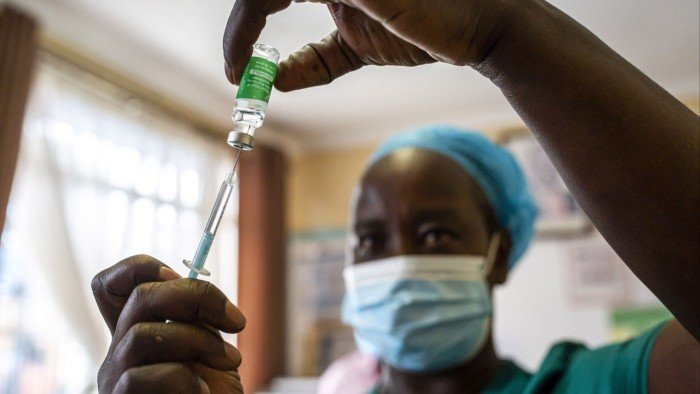Unlock the Editor’s Digest for free
Roula Khalaf, Editor of the FT, selects her favourite stories in this weekly newsletter.
World Health Organization countries have finally approved a treaty to combat future pandemics, boosting international disease control efforts that are under growing pressure from funding cuts and political rows.
Member states of the 194-nation global health body conditionally agreed on Tuesday to ensure countries that shared virus samples would receive disease tests, medicines and vaccines, after many poorer nations suffered shortages during the Covid-19 crisis.
The measures to tackle the resource inequities that blighted the global response to Covid-19 come after rich nations have slashed aid budgets and the US has announced it will leave the WHO. The new pandemic treaty will go for ratification by participant countries once an annex on the long-contentious topic of detecting and sharing data on emerging pathogens is agreed.
Tedros Adhanom Ghebreyesus, WHO director-general, hailed the treaty as a “historic” accord that would make the world safer.
“The agreement is a victory for public health, science and multilateral action,” he said. “It will ensure we, collectively, can better protect the world from future pandemic threats. It is also a recognition by the international community that our citizens, societies and economies must not be left vulnerable to again suffer losses like those endured during Covid-19.”
The pact was backed in Geneva by the WHO’s annual World Health Assembly of member states after winning support in a committee vote late on Monday. More than 120 countries supported it with none against, although 11 abstained, including Poland, Israel, Italy, Russia, Slovakia and Iran.
The agreement, originally meant to be finalised a year ago, aims to improve international mechanisms for pandemic prevention, preparedness and response.
The deal sets out a provisional mechanism in which participating drugs companies would aim to make 20 per cent of their real-time production of pandemic vaccines, medicines and diagnostic tests available to the WHO. These would be distributed according to public health risks and needs, with a particular focus on developing countries.
This mechanism — known as the Pathogen Access and Benefit Sharing system (Pabs) — will now go to an international working group to be drafted and negotiated for consideration at next year’s World Health Assembly.
An agreement on Pabs has been delayed by disagreements over proposals for pharmaceutical companies to fund the monitoring of new pathogens, which should in turn speed up efforts at vaccine development.
The pharmaceutical industry lobby group said the treaty was just a “starting point”, and its success would depend on how it was implemented.
David Reddy, director-general of the International Federation of Pharmaceutical Manufacturers and Associations, warned that intellectual property protections were essential for investment in research and development.
He called for the partnerships to be voluntary and on mutually agreed terms. The pathogen access and benefit system should “avoid unnecessary conditions” that could make it harder to share information quickly, he said.
The WHO international working group will also work on setting up a financial mechanism and global supply and logistics network to support the treaty’s efforts. When Covid-19 vaccines were rolled out starting at the end of 2020, many poorer countries had only meagre supplies after richer nations bought up most of the doses.
The pandemic accord has drawn criticism from conservatives in the US and other countries. They have attacked it as a threat to government sovereignty on health policy and intellectual property protection, although the pact’s supporters say it is neither.
The accord says that it does not provide the WHO with any authority to dictate government policies in areas such as travel restrictions, vaccination mandates or lockdowns.
International health experts welcomed the pandemic accord, but some queried whether all countries would comply — and, if not, what mechanisms would force them to do so.
It was “concerning” that the US would not be bound to the treaty, leaving other countries unsure what its approach to resource and data sharing would be, said Mishal Khan, professor of global public health at the London School of Hygiene and Tropical Medicine.
“It’s been a huge challenge to get to this point, so the fact that this has now been formally agreed at the World Health Assembly is very welcome,” Khan said. “But in reality we won’t know how useful this agreement is until the next pandemic hits.”
